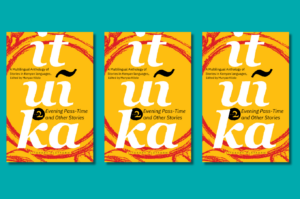
The Manchester Review has dedicated its entire Issue 18 to speculative fiction from Africa, and among the contributors are Nnedi Okorafor and Lauren Beukes.
With an introduction by Geoff Ryman, the issue is divided into six Parts. In Part One, titled “Lift Off,” there is fiction by Lauren Beukes, Ayodele Arigbabu, Doreen Baingana, and Peter Kalu. Part Two, “Publishing Venues, Workshops and Awards,” has fiction by Nnedi Okorafor, Irenosen Okojie, Jonathan Dotse, and Dayo Ntwari. Part Three, “Superheros, Gods and Politics,” has three co-authored works by Nick Wood and Tade Thompson, and another by Ziphozakhe Hlobo and Lena Posch.
Part Four, “South African Conundrums,” has Nick Mulgrew and Nerine Dorman. Part Five, “Nairobi Beatniks,” has fiction by Clifton Gachagua and Mehul Gohil. Part Six, “Living in an African Future,” has fiction by Shadreck Chikoti, Stephen Embleton, Tiseke Chilima, Muthi Nhlema, and Dilman Dila. Part Seven, “Do I Stay or Do I Go? Publishing Internationally, Writing Locally,” has fiction by Wole Talabi, Kofi Nyameye, and two works by Masima Musodza. The issue ends with two pieces by Geoff Ryman: “21 Tomorrow: Key Stories Available Online” and “21 Today: The Rise of Speculative Fiction, Year by Year.”

Read: Nnedi Okorafor, Lauren Beukes, Sofia Samatar Named in Power List of Top Sci-Fi and Fantasy Authors
Geoff Ryman—creative writing lecturer in Manchester University and recipient of the Arthur C Clarke Award, the British Science Fiction Award and the Nebula Award—does administrative work for the African Speculative Fiction Society (ASFS) and its Nommo Awards for Speculative Fiction by Africans. In 2016, courtesy of a Leverhulme International Academic Fellowship, he interviewed 100 African writers of speculative fiction.
Read: Wole Talabi’s Compilation of 654 Works of African Speculative Fiction Should Top Your Reading List
Here is an excerpt from his Introduction.
Things really took off about 2012. The earliest flickerings were about 2003 – though deep deep roots go back to earlier fantastic writing, and all the way into millennia of African culture.
This is a collection of damn good stories – plus a complete comic and an excerpt from a film script.
They tell tales about how South Africans will market themselves in the future. About how fire came to Uganda. About how two lonely women in the far future can each be writing a novel, one about the other. About how ancient West Africans wrote about the stars. About how superheroes are always political. About how people will in the future mourn their dead.
But each of the 21 stories is also a moment in history, part of the process. It stands for itself. It also stands for other similar stories, or writers who came with them in waves. They stand for the editors who founded venues that gave that story a home.
This is about how African speculative fiction gave birth to itself.
A year-by-year historical review will help tell that story and an Endnote will speculate about how the process may have worked.
Most of the 21 are available only in print. We want to make this fiction available to young Africans where they live – on their smartphones or tablets.
This is remarkable work that The Manchester Review and Ryman have done in collecting these pieces of writing.
Begin reading the issue HERE.









COMMENTS -
Reader Interactions